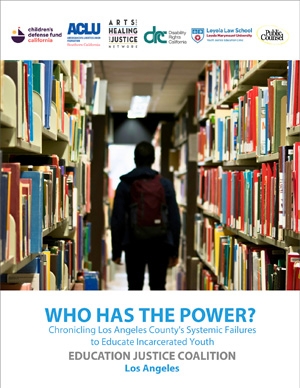"Who Has The Power?" Report Chronicles L.A. County’s Systemic Failure to Educate Incarcerated Youth

"Who Has The Power?" Report Chronicles L.A. County’s Systemic Failure to Educate Incarcerated Youth
LOS ANGELES —The Education Justice Coalition (EJC), a consortium of youth advocacy and civil rights groups, today released a new report that examines the historical failures of Los Angeles County’s juvenile detention system and the current conditions that young people incarcerated face.
Who Has the Power? Chronicling Los Angeles County’s Systemic Failures To Educate Incarcerated Youth outlines decades-long, systemic dysfunction and lack of accountability by the L.A. County Board of Supervisors and its agencies in their approach to juvenile detention that have led to current conditions.
“All youth in California, including youth who are incarcerated, have the fundamental right to an education,” said Vivian Wong, director of the Youth Justice Education Clinic at Loyola Law School and one of the authors of the report. “But over the years, federal and local agencies have found L.A. County out of compliance with minimum education standards for youth in its custody.”
As the report uncovers, the most recent, available data show abysmal indicators of access to education among young people incarcerated in the county including low graduation rates and high rates of suspension and absenteeism. During the 2023/24 school year, only one of three young people incarcerated in Los Padrinos graduated from high school while nearly one of four were suspended at least once that year. In that same year, 14% of students at Los Padrinos, or 79 students, were chronically absent or missing more than roughly four weeks of the school year.
The report comes as the county is ordered to depopulate Los Padrinos Juvenile Hall, and just weeks after the California attorney general filed a motion for receivership, which would force the county to relinquish control over the juvenile detention facilities. This move comes in response to growing concerns of overall conditions at facilities across the county.
Students with disabilities are extremely over-represented in juvenile detention facilities nationwide, in California, and in Los Angeles County. These young people are often pushed out of the schools in their communities through the school to prison pipeline, which DRC’s Youth Practice Group has long been advocating against through individual representation, policy advocacy, and litigation. We are proud to call attention to this critical issue as a member of the EJC and ask that students with disabilities in LA County detention facilities get the education that they deserve and to which they are legally entitled.
“We didn’t learn. The teachers wouldn’t do anything,” a youth leader who was incarcerated at Los Padrinos in 2024 shared his experience, as cited in the report. “The teachers would hand us a packet that we do over and over and over. [...] I get that we have a variety of age groups in one unit, but I was already in high school. It’s not fair to be learning about vowels and nouns like we’re dumb.”
The report explicitly outlines necessary and immediate actions that the county should take to address systemic issues related to education access:
- Do good on its commitment to fully implement “Youth Justice Reimagined,” a vision that necessarily requires the release of as many young people as possible from currently unsuitable juvenile detention facilities and prioritizing school stability by keeping young people in their communities.
- Ensure access to education and programming for those who are still detained. Incarcerated youth should have access to curriculum that is challenging, culturally affirming, and will set them up for postsecondary success.
- Enhance transparency and community-led accountability, so that all reforms are created and implemented by and with youth leaders and those who are most impacted.
“Young people have been telling us what they need, and the county needs to start showing up for them,” said Elida Ledesma, executive director of the Arts for Healing Justice Network, a member organization of the EJC. “Our report provides the county a blueprint of systemic solutions to address its systemic failures. It’s time for us to hold our county leaders accountable."
The EJC includes the Children’s Defense Fund-California, the ACLU Foundation of Southern California, Youth Justice Education Clinic at Loyola Law School, Public Counsel, Disability Rights California, and Arts for Healing and Justice Network.
(Please note: This document was not created by Disability Rights California and may not be accessible.)





